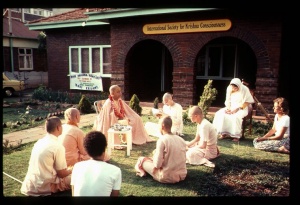SB 3.12.27: Difference between revisions
m (1 revision(s)) |
(Vanibot #0018 edit: make synonym terms in Sanskrit italic in SB - Vanisource) |
||
| Line 1: | Line 1: | ||
{{info | {{info | ||
|speaker=Maitreya | |speaker=Maitreya Ṛṣi | ||
|listener=Vidura | |listener=Vidura | ||
}} | }} | ||
[[Category:Srimad-Bhagavatam - Canto 03 Chapter 12]] | |||
[[Category:Bhagavatam Verses Spoken by Maitreya Rsi - Vanisource|031227]] | |||
<div style="float:left">'''[[Srimad-Bhagavatam]] - [[SB 3|Third Canto]] - [[SB 3.12: Creation of the Kumaras and Others|Chapter 12: Creation of the Kumāras and Others]]'''</div> | |||
<div style="float:right">[[File:Go-previous.png|link=SB 3.12.26]] '''[[SB 3.12.26]] - [[SB 3.12.28]]''' [[File:Go-next.png|link=SB 3.12.28]]</div> | |||
{{RandomImage}} | |||
==== TEXT 27 ==== | ==== TEXT 27 ==== | ||
<div | <div class="verse"> | ||
chāyāyāḥ kardamo jajñe | :chāyāyāḥ kardamo jajñe | ||
devahūtyāḥ patiḥ prabhuḥ | :devahūtyāḥ patiḥ prabhuḥ | ||
manaso dehataś cedaṁ | :manaso dehataś cedaṁ | ||
jajñe viśva-kṛto jagat | :jajñe viśva-kṛto jagat | ||
</div> | </div> | ||
| Line 16: | Line 22: | ||
==== SYNONYMS ==== | ==== SYNONYMS ==== | ||
<div | <div class="synonyms"> | ||
''chāyāyāḥ''—by the shadow; ''kardamaḥ''—Kardama Muni; ''jajñe''—became manifested; ''devahūtyāḥ''—of Devahūti; ''patiḥ''—husband; ''prabhuḥ''—the master; ''manasaḥ''—from the mind; ''dehataḥ''—from the body; ''ca''—also; ''idam''—this; ''jajñe''—developed; ''viśva''—the universe; ''kṛtaḥ''—of the creator; ''jagat''—cosmic manifestation. | |||
</div> | </div> | ||
| Line 23: | Line 29: | ||
==== TRANSLATION ==== | ==== TRANSLATION ==== | ||
<div | <div class="translation"> | ||
Sage Kardama, husband of the great Devahūti, was manifested from the shadow of Brahmā. Thus all became manifested from either the body or the mind of Brahmā. | Sage Kardama, husband of the great Devahūti, was manifested from the shadow of Brahmā. Thus all became manifested from either the body or the mind of Brahmā. | ||
</div> | </div> | ||
| Line 30: | Line 36: | ||
==== PURPORT ==== | ==== PURPORT ==== | ||
<div | <div class="purport"> | ||
Although one of the three modes of material nature is always prominent, they are never represented unalloyed by one another. Even in the most prominent existence of the two lower qualities, the modes of passion and ignorance, there is sometimes a tinge of the mode of goodness. Therefore all the sons generated from the body or the mind of Brahmā were in the modes of passion and ignorance, but some of them, like Kardama, were born in the mode of goodness. Nārada was born in the transcendental state of Brahmā. | Although one of the three modes of material nature is always prominent, they are never represented unalloyed by one another. Even in the most prominent existence of the two lower qualities, the modes of passion and ignorance, there is sometimes a tinge of the mode of goodness. Therefore all the sons generated from the body or the mind of Brahmā were in the modes of passion and ignorance, but some of them, like Kardama, were born in the mode of goodness. Nārada was born in the transcendental state of Brahmā. | ||
</div> | </div> | ||
__NOTOC__ | |||
<div style="float:right; clear:both;">[[File:Go-previous.png|link=SB 3.12.26]] '''[[SB 3.12.26]] - [[SB 3.12.28]]''' [[File:Go-next.png|link=SB 3.12.28]]</div> | |||
__NOTOC__ | |||
__NOEDITSECTION__ | |||
Revision as of 17:51, 30 November 2017

A.C. Bhaktivedanta Swami Prabhupada
TEXT 27
- chāyāyāḥ kardamo jajñe
- devahūtyāḥ patiḥ prabhuḥ
- manaso dehataś cedaṁ
- jajñe viśva-kṛto jagat
SYNONYMS
chāyāyāḥ—by the shadow; kardamaḥ—Kardama Muni; jajñe—became manifested; devahūtyāḥ—of Devahūti; patiḥ—husband; prabhuḥ—the master; manasaḥ—from the mind; dehataḥ—from the body; ca—also; idam—this; jajñe—developed; viśva—the universe; kṛtaḥ—of the creator; jagat—cosmic manifestation.
TRANSLATION
Sage Kardama, husband of the great Devahūti, was manifested from the shadow of Brahmā. Thus all became manifested from either the body or the mind of Brahmā.
PURPORT
Although one of the three modes of material nature is always prominent, they are never represented unalloyed by one another. Even in the most prominent existence of the two lower qualities, the modes of passion and ignorance, there is sometimes a tinge of the mode of goodness. Therefore all the sons generated from the body or the mind of Brahmā were in the modes of passion and ignorance, but some of them, like Kardama, were born in the mode of goodness. Nārada was born in the transcendental state of Brahmā.